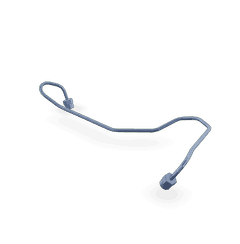This truck part is made by Cummins®. We guarantee that all of our parts are from the OEM (original equipment manufacturer), ensuring a proper fit and quality manufacturing.
We honor the warranty provided by the original equipment manufacturer.
Introduction
The Cummins Injector Fuel Supply Tube, identified by part number 3393534, is a critical component in the fuel system of heavy-duty trucks. Manufactured by Cummins Inc., a leader in diesel engine and power generation industries, this part ensures the efficient and reliable delivery of fuel to the injectors. Its design and functionality are tailored to meet the demanding requirements of heavy-duty applications, contributing to the overall performance and reliability of Cummins engines 3.
Basic Concepts
Injector fuel supply tubes are essential components within the fuel injection system of diesel engines. Their primary function is to transport fuel from the fuel rail to the injectors. These tubes operate under high pressure and precise timing, ensuring that fuel is delivered to the combustion chamber at the optimal moment for efficient combustion. They interact closely with other components such as the fuel rail, injectors, and the engine control unit (ECU), which regulates the fuel delivery process 2.
Purpose and Role
The Cummins Injector Fuel Supply Tube facilitates the delivery of fuel to the injectors under precise pressure and timing. This ensures that the fuel is atomized correctly within the combustion chamber, leading to efficient combustion and optimal engine performance. The tube’s ability to maintain consistent fuel pressure and flow is vital for the engine’s efficiency and power output 3.
Key Features
The Cummins Injector Fuel Supply Tube is designed with several key features that enhance its performance and durability. Constructed from high-quality materials, it is built to withstand the high pressures and temperatures within the fuel system. Its design includes precise engineering to ensure a secure fit within the fuel system, minimizing the risk of leaks. Additionally, the tube may incorporate features such as reinforced connections and corrosion-resistant coatings to further improve its longevity and reliability in demanding operating conditions 1.
Benefits
Utilizing the Cummins Injector Fuel Supply Tube offers several benefits. It contributes to improved fuel efficiency by ensuring that fuel is delivered to the injectors with minimal loss or leakage. This precise fuel delivery also enhances engine performance, providing consistent power and responsiveness. Furthermore, the tube’s robust construction and design ensure reliability, even under the strenuous conditions typical of heavy-duty truck operations 3.
Installation and Compatibility
Proper installation of the Cummins Injector Fuel Supply Tube is crucial for its effective operation and the overall performance of the fuel system. Installation procedures should follow manufacturer guidelines to ensure a secure and leak-free connection. The tube is designed to be compatible with various Cummins engine models, though specific compatibility details should be verified with Cummins documentation or a qualified technician to ensure the correct fit and function within the intended engine application 1.
Maintenance and Troubleshooting
Regular maintenance of the Cummins Injector Fuel Supply Tube is important to ensure its continued reliable operation. This includes periodic inspection for signs of wear, corrosion, or damage, and cleaning as necessary to remove any contaminants that could affect performance. Replacement intervals should be observed according to the manufacturer’s recommendations or based on the condition of the tube. Troubleshooting common issues such as fuel leaks or decreased performance may involve checking for proper installation, inspecting connections for tightness, and ensuring there are no obstructions or damage to the tube 2.
Cummins Overview
Cummins Inc. is a global power leader that designs, manufactures, and distributes a wide range of power solutions, including diesel and natural gas engines, as well as related technologies. With a history spanning over a century, Cummins has established a reputation for innovation, quality, and reliability in the automotive and heavy-duty truck industries. The company’s commitment to advancing technology and improving efficiency is evident in its comprehensive range of engine and component offerings, designed to meet the evolving needs of its customers 3.
Conclusion
The Cummins Injector Fuel Supply Tube (part number 3393534) is a vital component in the fuel delivery system of heavy-duty trucks. Its role in ensuring efficient and reliable fuel delivery to the injectors is crucial for maintaining engine performance and reliability. With its robust design, precise engineering, and compatibility with various Cummins engine models, this Cummins part plays a significant role in the overall efficiency and power output of Cummins engines. Regular maintenance and proper installation are essential to ensure the continued reliable operation of this part.
-
Bennett, S. (2012). Modern Diesel Technology: Light Duty Diesels. Cengage Learning.
↩ ↩ -
Brach, R. M. (2023). SAE International’s Dictionary of Vehicle Accident Reconstruction and Automotive Safety. SAE International.
↩ ↩ -
Lakshminarayanan, P. A., & Agarwal, A. K. (2019). Design and Development of Heavy Duty Diesel Engines: A Handbook. Springer.
↩ ↩ ↩ ↩
SPECIFICATIONS
RECOMMENDED PARTS
* Variable geometry turbocharger and electronic actuator repairs are not eligible to be claimed as over-the-counter under New or ReCon parts warranty for parts installed after October 1, 2018.
* Diesel Oxidation Catalyst (DOC), Diesel Particulate Filter (DPF), Selective Catalyst Reduction (SCR) catalyst, and Electronic Control Module (ECM) repairs are not eligible to be claimed as over-the-counter under New or ReCon parts warranty for parts installed after January 1, 2020.
* These restrictions are only applicable to New parts and ReCon parts coverages for the components listed above sold to a customer in the US or Canada. All other coverages are excluded. All other regions are excluded.


